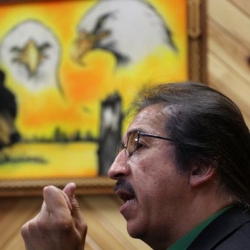For generations, the Menominee Tribe of Wisconsin has been beset with a number of social problems: poverty, high mortality rates, binge drinking, obesity, teenage births, and unemployment. According to a spokesman for the tribe, the Menominee reservation has the highest poverty rates in the state.
The Native American community now hopes that a proposed casino on their tribal lands will solve most, if not all, of those problems. The plan is to build a casino on the site of a closed dog track 200 miles from their reservation in Keshena, Wisconsin.
Proposed $800 Million Casino for Kenosha
If the tribe has its way, it will build an $800 million casino complex on the site of the old racetrack. Many in the tribe say the casino is essential for solving their people’s perennial quality of life issues.
The casino project was approved by the federal authorities in 2013, but Governor Scott Walker appears as if he will wait until after his November re-election campaign to decide whether to support the casino. The delay has frustrated Menominee tribal leaders, who believe the governor is playing politics with the lives and futures of their families.
James Reiter Calls for Governor to Act
James Reiter, who is the current general manager of the Menominee Casino project in Kenosha, told USA Today, “The longer (Walker) takes, the more hardship our people go through. We’re talking about hope. Giving people hope for a better future.”
While the gaming market in the northeast is saturated, revenues continue to remain steady in the Midwest. Wisconsin has nearly two dozen licensed casinos, and last year those gaming venues produced more than $1 billion in revenue for the tribes. But the Menominee Tribe feels left behind by the delays in having their casino approved.
Administration Spokesman Calls for Deliberation
The governor’s administration does not characterize the wait on a decision as a political issue. They say the project needs to be vetted thoroughly, so the people of Wisconsin are better served.
Cullen Werwie of the Wisconsin Department of Administration says Governor Walker wants to “conduct an independent financial and economic analysis” of the proposed Menominee Casino. The investigation is being conducted by Administration Secretary Mike Huebsch. Neither Werwie nor Walker has said when a decision is expected.
In such cases, executive officials, lawmakers, and regulators alike have to make sure the tribal authorities are not overstating their case. It is easy to plead poverty, but when a tribe which already operates gambling ventures is making a case for hardship, one has to check out the veracity of their claims. Such decisions take time and resources, but that can look to those from the outside like the government is stalling for time. The deadline for making a decision has been extended to February 19, a decision which allows the governor to campaign without the expansion of gambling being an issue.
Walker’s Opponent Has Not Taken a Stance
With no major decisions made on the issue in 2014, Walker’s opponent in November, Mary Burke, has not said whether she would approve such a proposal, if she were elected governor. It appears as if the Wisconsin tribal casino issue will not be a political factor in the upcoming elections.
Wisconsin Pollster Suggests No Effect on Re-Election
One law and public policy professor plays down the impact a decision on the Menominee Casino would have. Charles Franklin, a law professor and director of polling at Marquette Law School, says the decision would have minimal impact with less than 3 months until the election.
Professor Franklin added, “I don’t know that there is an absolute clear winning decision for the governor either way. It’s obviously a very complicated decision with lots of interest on both sides.”
When an issue isn’t a clear winner, then it is usually best for a politician to steer clear of it during a re-election campaign. That is just what the Republican incumbent hopes to do this fall. Scott Walker will be dealing with fallout from the 2011 state workers union protests and the resulting Act 10 Union Law decision. Walker faced contentious recall elections in 2011 and 2012 stemming from the controversy, and is unlikely to delve into other issues which could alienate voters before November election.

